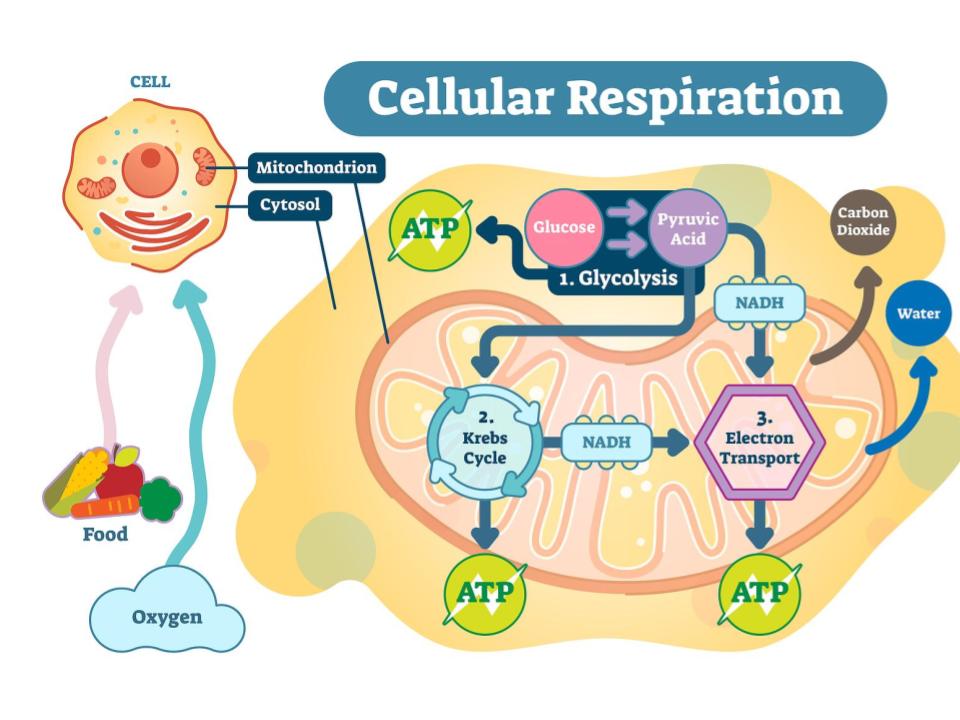Mitochondrial Function: Potential Ways to Maximise
As we’ve seen in Part One, how well our mitochondria (or energy powerhouses) function has a significant impact on multiple facets of our health. While there is a natural tendency for mitochondrial function to decline with age and oxidative stress, there are things you can do to help offset this… and research is bringing more potential options to light.
Key Points:
- Regularly performing aerobic exercise is an effective way to boost or maintain your mitochondrial function.
- Certain nutritional adjustments seem to have potential, although further evidence from human studies is required.
- Supplemental and medicinal options may also have a place, although the evidence in support of each is mixed. These include resveratol, NAD+ boosters, AMP-activated protein kinase activators and Cytochrome c oxidase inhibitors.
Aerobic exercise enhances mitochondrial function

Seeing as the mitochondria are the powerhouses of aerobic metabolism, it makes sense that aerobic exercise can boost their function. Conversely, it takes little time at all to lose mitochondrial function within muscle if you stop training.
There’s a little controversy regarding the specific effect of aerobic training volume and intensity, and their relative importance. Research generally suggests that intensity has a more pronounced effect on mitochondrial function, while volume primarily effects the quantity of mitochondrial proteins (the ones responsible for oxidative phosphorylation) within a cell. In contrast, a small 2017 study showed that high intensity interval training produced greater increases in mitochondrial proteins than a program that combined moderate intensity aerobic exercise and resistance training. Regardless, building up your intensity and/or volume over time is bound to provide some mitochondria-related benefits.
Resistance training alone doesn’t seem to have any effect.
Nutrition and mitochondrial function
A wide variety of nutritional factors are claimed to improve mitochondrial function- at least in animal studies. For example:

- CoQ10 (and analogues): a lipid soluble antioxidant that may also increase efficiency of the Electron Transport Chain
- Curcumin: beneficial in a mouse model of alzheimer’s disease
- α-lipoic acid and acetyl-L-carnitine: antioxidant effects and stimulate mitochondria formation within certain tissues
- Omega-3 PUFAs (especially EPA and DHA) have demonstrated benefits in animal models of diseases related to mitochondrial dysfunction eg: parkinson’s disease, alzheimer’s disease, cardiovascular diseases, diabetes, plus general aging and ROS-induced damages
Image credit: Artemidovna at https://www.bigstockphoto.com/
Ketogenic diets have also been proposed to enhance mitochondrial function. However, it is a bit premature to recommend them for the general populace. Promising results have mainly been obtained from studies into specific neurological conditions: both conditions such as epilepsy and brain injury, and the mitochondrial function have improved.

On the question of how ketogenic diets may improve mitochondrial function… it is proposed that by restricting glycolysis (i.e. stage 1 of metabolism, see diagram) and increasing usage of fatty acids, ketosis happens (unsurprisingly). Meanwhile, the krebs cycle (stage 2 of metabolism, see diagram) is also replenished, neurotransmitter and ion channel function restored, and mitochondrial respiration enhanced. Evidence also suggests that ketogenic diets can impact key signaling pathways that evolved to sense the energetic state of the cell.
Image credit: VectorMine at https://www.bigstockphoto.com/
A mice study also suggested that ketogenic diets slowed down deterioration in mitochondrial function within muscle cells. However, A 26 week study in rats suggested high fat diets (essentially what keto is) stimulated mitochondria formation in an attempt to compensate for other negative effects it had on oxidative metabolism i.e. resistance to insulin and the anti-inflammatory, glucose-regulating hormone adiponectin. As oxidative metabolism IS what mitochondria do, this possibility should be further explored before we can say that ketogenic diets are of net benefit, or not. The study also showed that effects may vary according to sex and muscle type, so this needs to be taken into account.
Can medicine improve mitochondrial function?
Medication offers another means of boosting mitochondria function. There is however some difficulty in identifying the best drugs, as our knowledge of the inner workings of mysterious mitochondria is still very much in its infancy. For example, 13 mitochondrial proteins are produced from mitochondrial DNA, but a lot more (approximately 1500) are produced from the DNA found within a cell’s nucleus. We are unsure just how these proteins, and their genes, work together, along with various other metabolites to regulate mitochondrial function. A holistic approach we can’t yet obtain is required for optimal drug therapy.
The below is a list of just a few examples of medicinal possibilities. There’s a lot more, but they’re beyond the scope of this article (and my drug-related smarts).
SIRT1 (sirtuin) agonists such as Resveratol
SIRT1 is an enzyme which (in conjunction witht the co-enzyme NAD+) alters proteins that regulate cells and is thought to have a beneficial effect in many age-related diseases.

Resveratrol- a natural phenol found in low concentrations in red grapes and wine- activated SIRT1. It seems to benefit mitochondria, particularly in cases of metabolic diseases. In mice with diet-induced obesity, it increased mitochondrial formation and oxidative capacity. The resulting improvement in muscle function and protection against obesity and insulin resistance, ultimately improved their healthspan. In obese people, it has also increased mitochondrial function and reduced blood fat levels, although the dose-reponses among people may be different to rodents’. Resveratol could also improve blood sugar control in people with type 2 diabetes.
Other SIRT1 activators (eg: SRT1720 and SRT2104) have been identified, and although their mechanism is unclear, they also have potential metabolic benefits. Further SIRT1 agonists are also in development.
NAD+ boosts for mitochondrial function
Following on from the above, supplementation with nicotinamide riboside or nicotinamide mononucleotide, or inhibition of enzymes that degrade NAD+ could enhance SIRTI activation, and therefore mitochondrial function. Animal studies provide support for this.

Activators of AMP-activated protein kinase (AMPK)
AMPK is another enzyme which enhances mitochondrial function. It is activated by high AMP:ATP ratios- which indicate low cellular energy supply. Mice studies have shown that a molecule known as AICAR can do this.
Cytochrome c oxidase (CcO) inhibition
A recent (April 17, 2020) study on mice showed moderately inhibiting CcO over the long-term could reduce ATP synthesis- but also promote production of new mitochondria and greater turnover of dysfunctional specimens, ultimately leading to a decrease in ROS production and less mitochondrial decay.
Reactive Oxygen Species scavenging drugs
Theoretically these should be beneficial, as they could reduce oxidative damage to mitochondrial DNA. However, trials of such drugs have so far had little success.
The Verdict
If you want to boost your mitochondrial function for improved health, one of the best bets is to do exercise your heart and lungs regularly. Either increasing the amount or intensity of aerobic exercise you do will reap benefits, although we do not know if one is more efficient than the other. If you’re not a regular huff-and-puffer, I’d recommend you start by getting out and moving at a manageable intensity regularly, whether that’s by walking, cycling, swimming, dancing or anything else. From there, build up how long you can continue moving for and/or how often you go out. If/when you already have decent fitness and endurance, you can build up the intensity. Nutritional tweaks and/or some supplements (eg: resveratol) may give your mitochondria a further edge, although we are awaiting future research to be certain of these.
What will you do to care for your mitochondria?
References
Ahola-Erkkilä, S., Carroll, C.J., Peltola-Mjösund, K. et al. (2010). Ketogenic diet slows down mitochondrial myopathy progression in mice. Human Molecular Genetics, 19(10): 1974–1984. https://doi.org/10.1093/hmg/ddq076
Andreux, P., Houtkooper, R. & Auwerx, J. Pharmacological approaches to restore mitochondrial function. Nat Rev Drug Discov 12, 465–483 (2013). https://doi.org/10.1038/nrd4023
Bishop, D.J., Granata, C., and Eynon, N. (2014). Can we optimise the exercise training prescription to maximise improvements in mitochondria function and content? Biochimica et Biophysica Acta (BBA) – General Subjects, 1840(4):1266-1275. https://doi.org/10.1016/j.bbagen.2013.10.012.
Gómez-Pérez, Y., Capllonch-Amer, G., Gianotti, M. et al. (2012). Long-term high-fat-diet feeding induces skeletal muscle mitochondrial biogenesis in rats in a sex-dependent and muscle-type specific manner. Nutr Metab (Lond) 9, 15. https://doi.org/10.1186/1743-7075-9-15
Granata, C., Jamnick, N.A. & Bishop, D.J. (2018) Principles of Exercise Prescription, and How They Influence Exercise-Induced Changes of Transcription Factors and Other Regulators of Mitochondrial Biogenesis. Sports Med 48, 1541–1559. https://doi.org/10.1007/s40279-018-0894-4
Hagl, S., Heinrich, M., Kocher, A. et al.(2014). Curcumin Micelles Improve Mitochondrial Function in a Mouse Model of Alzheimer’s Disease. The Journal of Prevention of Alzheimer’s Disease. 1(2):80-83. https://ganzheitliche-gesundheit.info/wp-content/uploads/2015/09/Alzheimer_Studie_Eckert.pdf
Hargreaves, I.P. (2014). Coenzyme Q10 as a therapy for mitochondrial disease. The International Journal of Biochemistry & Cell Biology. 49:105-111.
Liu, J. (2008). The Effects and Mechanisms of Mitochondrial Nutrient α-Lipoic Acid on Improving Age-Associated Mitochondrial and Cognitive Dysfunction: An Overview. Neurochem Res 33, 194–203 https://doi.org/10.1007/s11064-007-9403-0
Robinson, M.M., Dasari, S., Konopka, A.R. et al. (2017). Enhanced Protein Translation Underlies Improved Metabolic and Physical Adaptations to Different Exercise Training Modes in Young and Old Humans. Clinical and Translational Report. 25(3):581-592. DOI:https://doi.org/10.1016/j.cmet.2017.02.009
Tavallaie, M., Voshtani, R., Deng, X. et al. (2020). Moderation of mitochondrial respiration mitigates metabolic syndrome of aging. Proceedings of the National Academy of Sciences. 117 (18) 9840-9850; DOI: 10.1073/pnas.1917948117
